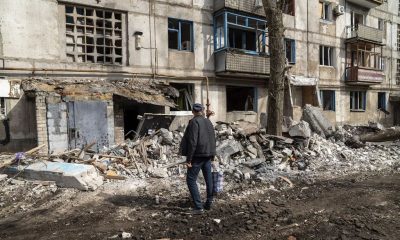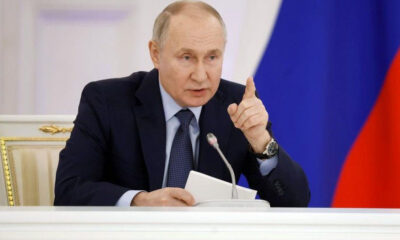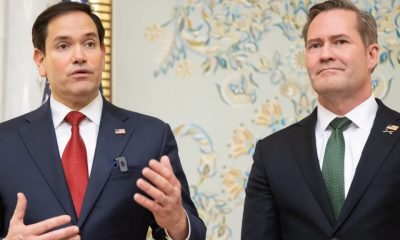International
Putin’s Invasion of Ukraine Creating a World Food Security Catastrophe

As Vladimir Putin’s brutal assault on Ukraine presses forward, the devastating impacts of war are rattling the most vulnerable corners of the world, driving millions toward starvation.
In Ukraine, tens of thousands remain trapped without access to food and water. Beyond its borders, millions more are teetering on the edge of famine.
“We are on a countdown to catastrophe,” David Beasley, executive director of the U.N. World Food Programme said, “and we are running out of time to avoid it.”
Ukraine has long been known as ‘the breadbasket of Europe,’ and is one of the top three grain producers in the world, according to Farming Life. Russia and Ukraine together account for nearly one third of the world’s traded wheat and 12% of its calories, National Geographic reported, with some 26 countries relying heavily on both nations for food security.
But as Russia’s attack on its neighbor has all but shut down grain exports from the region, both vital supply chains have been shattered. Without them, food prices and shortages are spiraling, and the world is left to face its greatest food crisis since the last great war.
Beasley said the war in Ukraine has created “a catastrophe on top of a catastrophe,” and will have a global impact “beyond anything we’ve seen since World War II,” according to Time,
READ ALSO:
- Train attack: Five more passengers found safe, 141 others unknown, another coach recovered
- Malami declares intention to contest for Kebbi State governor
- Pastor demolishes church after catching wife kissing his assistant
The ripple effects of this war will devastate already vulnerable countries like Afghanistan, Foreign Policy reported, where millions of people don’t have enough food and babies are dying of malnutrition.
“With each month that goes by, more Afghans are forced to resort to the unimaginable to survive,” Amanda Catanzano, the International Rescue Committee’s acting vice president of policy and advocacy, said, according to USA Today.
“Parents are being forced to make decisions no one should have to consider,” she added, “including selling off young daughters, so they can buy food for the rest of their children.”
In the Middle East, millions of people whose lives have already been turned upside down by violence, displacement and poverty, AP reported, are left wondering where their next meal will come from.
“We can’t forget that these multiple hunger crises are going on at the same time,” Danielle Nierenberg, president of Food Tank, told Newsweek. “One is not more important.”
“Right now,” she added, “the long-term consequences are what I’m most afraid for.”
Experts fear that critical humanitarian aid may be diverted from the Middle East and North Africa in an effort to support the equally dire crisis in Ukraine, the consequences of which could be deadly.
“For the millions of Palestinians, Lebanese, Yemenis, Syrians, and others who live in countries experiencing conflict, catastrophic economic meltdowns, and increasing humanitarian needs,” Carnegie Middle East experts said, “this would be equivalent to shutting down critical life support.”
Joyce Msuya, Assistant Secretary-General for Humanitarian Affairs and Deputy Emergency Relief Coordinator, told the U.N. Security Council that the global impacts of this war are becoming clearer every day.
“Civilians are running out of food, energy and hope,” she added.
Beasley warned the Security Council that the war in Ukraine has turned the country “from a breadbasket to a bread line” for millions of its people, while devastating countries that rely on the region for food security.
His agency was feeding 125 million people around the world before Vladimir Putin’s invasion of Ukraine, Time reported. Due to rising food, fuel and shipping costs increasing the agency’s monthly expenses by $71 million, it has had to start cutting those rations.
In war-torn Yemen, eight million people just had their food allotment cut by 50%, Beasely said, according to Time, “and now we’re looking at going to zero rations.”
READ ALSO:
- How long should vehicle tyres last?
- Tundun MKO-Abiola attacks Hafsat for using their father’s name for Yahaya Bello’s campaign
- FG paid N7.27bn for debt servicing to W’Bank, IMF – Report
In Yemen, 31,000 people are currently facing famine-like conditions, according to data from the WFP, and 161,000 people are expected to be at risk come June.
Because of the ongoing assault against Ukraine, Time reported, the WFP will have to abandon services to four million people in other parts of the world.
On February 24, Ukrainians awoke to the sound of bombs exploding as Russia officially declared war against their homeland. In the weeks that have followed, death and devastation have littered the streets of of their homeland — and their farmland.
The country has largely lost access to heat and electricity and is facing severe shortages of food, water and essential medicine. People are sheltering in basements, the Guardian reported, trying to survive without food and drinking melted snow because the water has been cut off.
As a result, millions are making the painful decision to flee their country. But the journey across the border is no less harrowing, and many Ukrainian families are traveling for days without food.
Amid the terror, strangers are increasingly showing up to support Ukrainians — and humanity.
Within hours of the initial invasion, World Central Kitchen (WCK), a not-for-profit non-governmental organization dedicated to providing meals in the midst of disaster, partnered with Ukrainian restaurants, chefs and volunteers from around the world and began serving warm, nourishing meals to Ukrainian refugees.
“Feeding people is what makes sense,” Jose Andres, founder of WCK, told NPR. “Longer tables, people working together to make sure that one plate of food at a time we can bring hope of a better tomorrow.”
Without hesitation, WCK made a promise to continue helping in the best way it knows, ‘with a freshly prepared plate of food,’ for as long as needed.
“I’m still here,” Marc Murphy, executive chef and restaurateur who is working with WCK in Poland, told Newsweek. “I’ve been here almost three weeks now, and I’m not sure when I’m going back.”
The organization has served five million meals across seven countries as part of the Chefs for Ukraine response, Chloe Mata Crane, executive vice president of Baltz & Co, told Newsweek, and is currently serving over 250 thousand meals per day.
When the war broke out, Murphy knew he couldn’t sit on the sidelines as people suffered.
“Eating a meal is a human right,” he said. “I have the skills to cook. I’ve run large kitchens, I’ve done a lot of this stuff. So I thought, ‘maybe I can lend a helping hand.'”
For Andres, food is about far more than just nutrition.
“Food relief is not just a meal that keeps hunger away,” Andres said. “It’s a plate of hope. It tells you in your darkest hour that someone, somewhere, cares about you.”
On one visit to the border with warm stew and hot chocolate, Murphy met three young girls waiting for a ride from a friend of their parents.
“The mom drove them to the border, they walked across and they were waiting,” Murphy said. “Having some stew and waiting. They didn’t even know where they were going.”
“It’s hard to imagine,” Murphy added. “But that’s one story. And you know there’s thousands a day of those stories. That’s the sad part.”
But the aid givers realize they face a daunting task.
“If we end the conflict, address the needs, we can avoid famine, destabilization of nations and mass migration,” Beasley said. “But if we don’t, the world will pay a mighty price.”
“And the last thing [we] want to do,” he added, “is take food from hungry children to give to starving children.”
NEWSWEEK
International
Despite trade spat with US, China exports rises 12.4%
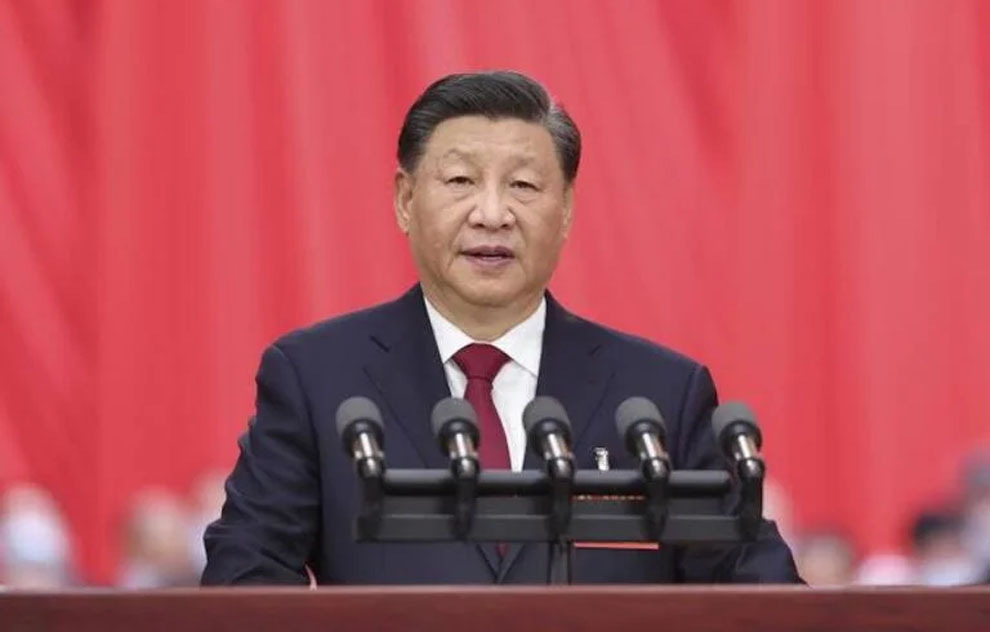
Despite trade spat with US, China exports rises 12.4%
China announced on Monday that its exports surged by 12.4% in March compared to the same period last year, defying forecasts and demonstrating resilience amid growing trade tensions with the United States.
According to figures released by the General Administration of Customs, the increase in outbound shipments more than doubled Bloomberg’s earlier prediction of 4.6%.
This performance comes as businesses rushed to beat a new wave of US tariffs introduced by President Donald Trump on his so-called “Liberation Day.”
Beijing and Washington remain entangled in a high-stakes trade standoff that has seen tit-for-tat tariff hikes. US tariffs on Chinese imports have risen to 145 percent, with Beijing retaliating by imposing a 125 percent levy on American goods.
Imports into China during the same period dropped by 4.3 percent. While still negative, this was a slight improvement from earlier months and suggested an uptick in domestic consumption.
Beijing reported that the United States was still China’s largest single export destination from January to March, accounting for $115.6 billion in trade. Remarkably, even as tensions escalated and new tariffs were introduced in March, exports to the US climbed roughly nine percent year-on-year.
China has set an annual growth target of around five percent, aiming to shift its focus towards domestic demand as the main engine of economic expansion. However, Trump’s trade war is emerging as a fresh challenge to this recovery strategy.
READ ALSO:
- Tinubu not in France for medical attention – Presidency
- Eedris Abdulkareem: I didn’t attack Seyi Tinubu with my new song
- Our position on Tinubu/Shettima 2027 campaign billboards – Presidency
The US government appeared to ease pressure slightly on Friday by announcing exemptions for several tech products, including smartphones, laptops, and semiconductors—key categories in which China plays a dominant role.
Analysts said the March export surge was likely driven by a wave of frontloading by companies aiming to ship goods before the April 2 tariffs kicked in.
“The strong export data reflect frontloading of trade before the US tariffs were announced,” said Zhiwei Zhang, President and Chief Economist at Pinpoint Asset Management. “China’s exports will likely weaken in the coming months as the US tariffs skyrocket,” he added.
Zhang also noted that “The uncertainty of trade policies is extremely high.”
Julian Evans-Pritchard, head of China economics at Capital Economics, added, “In anticipation of even higher duties, demand from US importers continued to hold up fairly well” in March. “But shipments are set to drop back over the coming months and quarters,” he warned. “It could be years before Chinese exports regain current levels.”
Despite efforts to boost the economy, China is still battling weak consumption and an ongoing debt crisis in the property sector. Last year, authorities introduced aggressive policies—including interest rate cuts, relaxed home-buying rules, higher debt ceilings for local governments, and market support measures.
However, enthusiasm faded when no concrete figures or timelines were released for a much-anticipated economic stimulus.
As the trade war intensifies, China’s ability to maintain export growth and achieve its economic goals will remain under close international scrutiny.
Despite trade spat with US, China exports rises 12.4%
International
US, Iran hold ‘constructive’ first round of nuclear talks
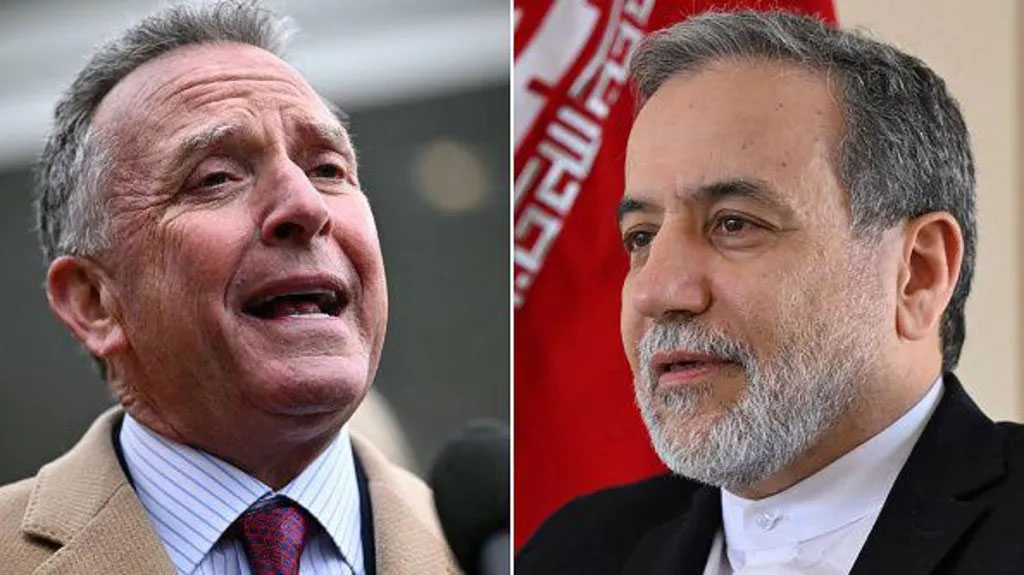
US, Iran hold ‘constructive’ first round of nuclear talks
Iran and the US have concluded a first round of talks in Oman over Tehran’s nuclear programme – the highest-level meeting between the two nations since 2018.
Both countries described the meeting as “constructive” and confirmed a second round of discussions will take place next week – with the US hailing the “direct communication” as being key to striking a possible deal.
President Donald Trump pulled the US out of a previous nuclear agreement between Iran and world powers in 2018, and has long said he would make a “better” deal.
The talks are seen as an important first step in establishing whether a deal can be done.
At two-and-a-half hours, the first meeting was brief, reportedly respectful – and set the stage for a second round.
That was probably as good as it could get when Iranian and US officials sat down in Muscat, the capital of Oman – whose top diplomat mediated the primarily indirect negotiations.
They were the most significant talks since Trump pulled the US out of the Iran nuclear deal of 2015 during his first term in office.
The verdict of Iran’s lead negotiator, Foreign Minister Abbas Araghchi, was positive.
“In my opinion, as the first meeting, it was a constructive meeting held in a very peaceful and respectful environment, because no inappropriate language was used,” he told Iranian state TV.
His diplomatic tone suggests the US team led by Trump’s envoy Steve Witkoff did not reiterate some of the president’s threats that Iran would face “great danger” if this dialogue did not succeed. He has repeatedly warned of possible military strikes.
READ ALSO:
- 2025 UTME: JAMB releases mock results
- Trump exempts smartphones, computers from new tariffs
- Gaza hospital hit by Israeli strike, Hamas-run health ministry says
This meeting ran with the delegations in separate rooms, relaying messages through Oman’s foreign minister, Badr bin Hamad al-Busaidi.
Witkoff, who is leading the US delegation, had previously only spoken of meeting face-to-face.
But Araghchi and Witkoff did speak for a few minutes in the presence of Busaidi – not the direct talks US officials said would happen but what could be a small but significant opening.
Iran, mindful of pressure from hardliners at home, underlined how limited their face-to-face exchange was, with no photographs taken.
In a statement following the talks, the White House said the discussions “were very positive and constructive”, noting that Witkoff had emphasised to Iran that he had instructions to resolve the adversaries’ “differences through dialogue and diplomacy, if that is possible”.
“These issues are very complicated, and special envoy Witkoff’s direct communication today was a step forward in achieving a mutually beneficial outcome,” the statement added.
Araghchi had said ahead of the discussions that his country wanted a “fair agreement”.
After the talks concluded, he said discussions next week may not happen in Oman, but would still be mediated by the Middle Eastern nation. The White House said they would take place next Saturday.
“Neither we, nor the other party, want fruitless negotiations, discussions for discussions’ sake, time wasting or talks that drag on forever,” Araghchi told Iranian state television.
The most important issue at stake is what kind of deal each side would be willing to accept.
Trump sent a letter to Iran’s supreme leader via the United Arab Emirates last month, saying he wanted a deal to prevent Iran from acquiring nuclear weapons and to avert possible military strikes by the US and Israel.
Iran hopes for a deal to limit, but not dismantle, its nuclear programme in exchange for sanctions relief.
An unnamed source in Oman told news agency Reuters that the talks would seek to de-escalate regional tensions and secure prisoner exchanges.
READ ALSO:
- Massilia Motors launches new Mitsubishi L200 with low fuel consumption, advanced engineering
- London mother sentenced to life in prison for drowning two sons
- LASRRA, LASDA to launch strategic documentation drive for Lagos diaspora database
Trump revealed the talks would take place during a visit by Benjamin Netanyahu to the White House on Monday. The Israeli prime minister said on Tuesday that both leaders had agreed that Iran “will not have nuclear weapons”.
Netanyahu has called for a “Libya-style deal”, referring to the north African nation completely dismantling its weapons programme in an agreement reached with Western powers in 2003. That would be completely unacceptable to Iran.
Iran insists its nuclear activities are entirely peaceful and that it will never seek to develop or acquire nuclear weapons.
Iranian officials have made it clear the negotiations will focus only on its nuclear programme, not its broader defence capability, such as its ballistic missile programme.
Ahead of the talks, Trump said on Friday that he wanted Iran “to be a wonderful, great, happy country – but they can’t have nuclear weapons”.
Trump has warned that the US would use military force if a deal was not reached, and Iran has repeatedly said it will not negotiate under pressure.
But this process is taking place under immense pressure.
Even as preparations were under way to arrange this first meeting, the US moved more warships and stealth bombers to the region and imposed more sanctions.
The US president told reporters in the Oval Office on Monday it would “be a very bad day for Iran” if the talks were unsuccessful.
Iran insists its nuclear activities are entirely peaceful and that it will never seek to develop or acquire nuclear weapons.
However, since Trump pulled out of the 2015 agreement – which expires later this year – Iran has increasingly breached restrictions imposed by the existing nuclear deal in retaliation for crippling US sanctions reinstated seven years ago, and has stockpiled enough highly-enriched uranium to make several bombs.
Under the terms of the 2015 deal, Iran agreed to only enrich uranium up to 3.67% purity for the next 15 years.
In February, the International Atomic Energy Agency (IAEA) nuclear watchdog reported that Tehran had stockpiled uranium enriched to 60% purity and could swiftly move to 90%, which would be weapons-grade.
The 2015 nuclear deal took nearly two years of intensive negotiations. At the start of this new effort to reach an agreement, Iran’s programme is far more developed and complex, and the wider region is far more volatile.
US, Iran hold ‘constructive’ first round of nuclear talks
BBC
International
Trump exempts smartphones, computers from new tariffs

Trump exempts smartphones, computers from new tariffs
US President Donald Trump’s administration has exempted smartphones, computers and some other electronic devices from “reciprocal” tariffs, including the 125% levies imposed on Chinese imports.
In a notice, US Customs and Border Patrol said that the goods would be excluded from Trump’s 10% global tariff on most countries and the much larger Chinese import tax.
It marks the first significant reprieve of any kind in Trump’s tariffs on China, with one trade analyst describing it as a “game-changer scenario”.
Late on Saturday, while travelling to Miami, Trump said he would give more details of the exemptions at the start of next week.
“We’ll be very specific,” he told reporters on Air Force One. “But we’re taking in a lot of money. As a country we’re taking in a lot of money.”
The move came after concerns from US tech companies that the price of gadgets could skyrocket, as many of them are made in China.
Exemptions – backdated to 5 April – also include other electronic devices and components, including semiconductors, solar cells and memory cards.
READ ALSO:
- Gaza hospital hit by Israeli strike, Hamas-run health ministry says
- Massilia Motors launches new Mitsubishi L200 with low fuel consumption, advanced engineering
- London mother sentenced to life in prison for drowning two sons
“This is the dream scenario for tech investors,” Dan Ives, who is the global head of technology research at Wedbush Securities, posted on X. “Smartphones, chips being excluded is a game-changer scenario when it comes to China tariffs.”
Big tech firms such as Apple, Nvidia, Microsoft and the broader tech industry can breathe a huge sigh of relief this weekend, he added.
The White House indicated the exemptions were made to ensure companies had more time to move production to the US.
“President Trump has made it clear America cannot rely on China to manufacture critical technologies such as semiconductors, chips, smartphones, and laptops,” White House Press Secretary Karoline Leavitt said in a statement.
“At the direction of the president, these companies are hustling to onshore their manufacturing in the United States as soon as possible.”
Trump, who is spending the weekend at his Florida home, told reporters on Friday he was comfortable with the high tariffs on China.
“And I think something positive is going to come out of that,” he said, touting his relationship with Chinese President Xi Jinping.
These electronic goods are still subject to the 20% tariff on China related to fentanyl, White House Deputy Chief of Staff on Policy Stephen Miller posted on X.
Some estimates suggested iPhone prices in the US could have as much as tripled if costs were passed on to consumers.
The US is a major market for iPhones, while Apple accounted for more than half of its smartphones sales last year, according to Counterpoint Research.
It says as much as 80% of Apple’s iPhones intended for US sale are made in China, with the remaining 20% made in India.
Like its fellow smartphone giant Samsung, Apple has been trying to diversify its supply chains to avoid an over-reliance on China in recent years.
India and Vietnam emerged as frontrunners for additional manufacturing hubs.
As the tariffs took effect, Apple reportedly looked to speed up and increase its production of India-produced devices in recent days.
Trump had planned for a host of steep tariffs on countries around the world to take effect this week.
But on Wednesday he announced he would implement a 90-day pause for countries hit by higher US tariffs – except China, whose tariffs he raised to 145%.
Trump said the tariff increase for China was because of the country’s readiness to retaliate with its own 84% levy on US goods.
In a dramatic change of policy, Trump said all countries that had not retaliated against US tariffs would receive the reprieve – and only face a blanket tariff of 10% – until July.
The White House then said the move was a negotiating tactic to extract more favourable trade terms from other countries.
Trump has said his import taxes will address unfairness in the global trading system, as well as bring jobs and factories back to the US.
Trump exempts smartphones, computers from new tariffs
BBC
-

 metro2 days ago
metro2 days agoKidnapping: Our lives are hanging by a thread, residents of Igbogbo-Baiyeku communities in Lagos cry out
-

 International3 days ago
International3 days agoUS announces new visa requirements for Nigerian applicants
-

 International2 days ago
International2 days agoUS embassy announces new visa interview requirements for Nigerian applicants
-

 Sports2 days ago
Sports2 days agoBreaking: Former Super Eagles coach Christian Chukwu passes away at 74
-
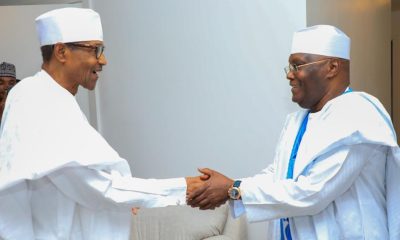
 Politics3 days ago
Politics3 days agoAtiku leads Tambuwal, El-Rufai, others to Buhari as 2027 election draws near
-

 metro3 days ago
metro3 days agoIbadan Pastor ends 30-year-marriage over sex dispute with wife
-

 metro3 days ago
metro3 days agoKemi Olunloyo angry, disowns family after father’s death
-
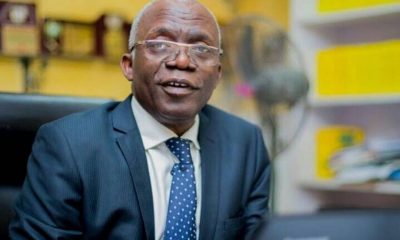
 metro3 days ago
metro3 days agoDefamation: Falana urges Akpabio to sue without involving police





